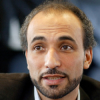Tariq Ramadan

Tariq Ramadan
Tariq Ramadanis a Swiss academic, philosopher and writer. He is the professor of Contemporary Islamic Studies in the Faculty of Oriental Studies at St Antony's College, Oxford and also teaches at the Oxford Faculty of Theology. He is a visiting professor at the Faculty of Islamic Studies, the Université Mundiapolisand several other universities around world. He is also a senior research fellow at Doshisha University. He is the director of the Research Centre of Islamic Legislation and Ethics, based in...
NationalitySwiss
ProfessionWriter
Date of Birth26 August 1962
CountrySwitzerland
There is great potential and deep fragility [in Malaysia] that can be used by any group that stresses on religion, pushing towards Islam, rejecting people and alienating migrants - anything can be used to win the next elections. So these are the signs of fragility that is very much there.
Prayer is better than to sleep. Wake up. Wake up & pray. This is the way you free yourself.
In sha Allah, God willing, must be the expression of humility of the active actors and it must never be the justification of the passive observers
My experience of living with people of diverse religions and cultures taught me that one will never be at peace with the other if one is at war with oneself.
I focus on Islamic applied ethics in many fields, and here I am saying that coming back to the Qu'ran and the sunnah as our reference point does not mean that we depend for our ethics on 'Islam as opposed to the others'.
We have to reconcile ourselves with philosophical questions in every field. Every field should be open to inquiry and knowledge.
The month of Ramadan is the world's most widespread fast and yet its teachings are minimised, neglected and even betrayed (through literal application of rules that overlooks their ultimate objective).
The diversity is the risk of war, the necessity of diversity is mutual respect
When I go back to the Quran I see that the context of Revelation is creation in its entirety. The universe is a Revelation and this of course includes nature, plants and animals. In other words, what is coming from the Quran as rules and objectives are set within the larger scheme of the universe and nature as part of Creation.
Religious symbols should be visible in public space, in a dignified and non-provocative manner. Christmas trees here, Jewish menorahs there and, further along, a minaret - these symbols represent human life in all its diversity.
The universality of Islam is not uniformity, it is unity with diversity.
Serve humanity, regardless of religion. Show solidarity for those suffering and oppressed.
Unfortunately there are some trends that are changing this but you don't have for example as strict and narrow understanding of the relationship between men and women. And then there is the philosophy we have to extract in the relationship between text and culture.
The challenge for Muslims in America is to respect the fears of ordinary people while resisting the exploitation of those fears by political parties, lobbies and sectors of the media. To meet this challenge, Muslims must reassess their own involvement, behavior and contributions in American society.